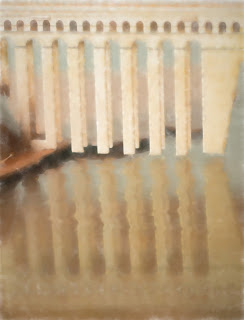Why did you choose me? - Novel "Letters"
After their advisors retired, Calpurnia and Pliny relaxed on the balcony. In the evening light, the light of the sinking sun cut the spars and ropes of a dozen merchant ships, and the din of the city quietened with the distant shouts of sailors preparing for the night.
"Tell me, why did you choose me?"
Pliny smiled, "The Fates predestined us together be."
Calpurnia frowned. "The Fates are a convenient excuse for all manner of mischief. Tell me, man, that I have followed to the end of the world, 'Why me?'"
"If I tried to give you a complete account, you would fall asleep before I had set the scene. But, why that question? I thought you were eager to discuss Dio Chrysostom."
"Tonight, I wish for nothing more than to relax on this couch and listen to your voice."
Pliny searched for her smile, flickering in the light of oil lamps and the last reflected rays of the sun.
He started, "Let me not tell you 'why' - for you can see that in my eyes. Instead, let me try to remember how.
I have told you of my friendship with Julius Frontinus, who served as consul with the Emperor. In his final years, I would sometimes meet with him after being appointed Supervisor of Aqueducts. He explained how winter snow and rain in different catchments influenced capacity and flow in the nine aqueducts of Rome and how 'taking the auspices" - studying the behavior of birds - gave him insights into the management of the aqueducts. Sometimes we would meet over a meal and discuss how to reduce water theft by the rich using formal seals.
On one occasion, while inspecting renovations to the Aqua Marcia, he turned the conversation to the College of Augers, our priestly convocation. His priestly duties as an augur involved access to our best information about the weather. They allowed him to manage the purity of the water of each aqueduct without having to resort to the practice of his predecessors, mixing the sources.
While we were talking, he pressed me to consider the possibility of an appointment as a priest of the College of Augurs. The suggestion humbled me. Unlike most other official posts, an Augur is appointed for life. As I listened, I could feel the hand of the Emperor moving. Fontinus outlined the exceptional powers of an Augur: from choosing the location and aspect of public or sacred buildings right through to the closing of official functions because of inclement weather.
Calpurnia chuckled, "An Imperial Weather-man."
Pliny shot her a look, "Forecasting the weather is a tricky business, for the Gods often have second thoughts about the day. Still, the behavior of birds and how they flee ahead of the storm or, other-wise, descend on food before more gentle rain, allow concrete observation to replace mere guesswork."
Calpurnia cocked her head, "And how did the birds lead you to me?"
"Frontinus identified one little problem. I could not be considered for appointment to the Council of Augurs until I remarried. Not just a tent marriage: it would have to be a formal marriage under the strictest Roman forms with all the trappings, including a virgin. And, as you know, my partner would need to be prepared to take on onerous ceremonial duties in her own right. It could not be a marriage of convenience. While the appointment was for life, in law, it ceased on divorce or death of the spouse. I told Julius Frontinus, with a sinking heart, that I could not rush these things. In truth, the loss of my first wife had been the cause of great grief which..."
Here Pliny paused, and Calpurnia stood and came, stood next to him. She took his hand and murmured, "They were difficult days, now passed."
"So I commenced my search by starting with the person whose judgment in these things I trust: our foster aunt C. Hispulla. Instead of making helpful suggestions, she took the opportunity to confide in me a particular issue she was facing: the disposition of a young woman called Calpurnia who...
And then Calpurnia kissed him deeply, lest other secrets of the past drift into the future.
Notes: Pliny's readers would have been familiar with the Roman knight, Julius Frontinus, a close friend of Emperor Trajan and a respected civil engineer. Residents of Rome loved him for improving the quality of Roman drinking water. Surprisingly, Pliny's appointment to the Council of Augurs has seldom been accorded any particular significance - but might be seen as Trajan building (in this case through an old trusted acquaintance, Frontinus) a 'long-game team.' The appointment motivates marriage to Calpurnia at that time.
The day-to-day work of Augurs is shrouded in mystery. Still, in addition to exercising the mystic power to designate sacred spaces, a simple scan of practical abilities puts them as final arbiters of official building approval and the authors of weather alerts that closed outdoor Roman events.
A letter to his friend Matures Arrianus at his appointment identifies Frontinus as his probable patron in the selection. There is a vainglorious reference to him achieving the priesthood and consulship at a time earlier than the other, but this is balanced by a reflection that, while he has been given all that the state can bestow on a loyal citizen, only the Gods can grant serenity of mind.
The Pliny collection includes a letter from Pliny to their foster aunt C. Hispulla, thanking her for bringing them both up (at different times) and forgiving one to the other.
This is a part of the Novel 'Letters" being written here.





Comments